Clays Lane Estate
2012 Summer OlympicsFormer buildings and structures in the London Borough of NewhamHousing associations based in EnglandHousing cooperatives in the United KingdomHousing organisations based in London

The Clays Lane Estate was a housing estate in Stratford, east London, and the UK’s largest (and Europe's second largest) purpose built housing cooperative. It was an experiment in building close-knit communities as a way of helping vulnerable single people. It became the subject of significant controversy when it was demolished to make way for the site of the London 2012 Olympic games.
Excerpt from the Wikipedia article Clays Lane Estate (License: CC BY-SA 3.0, Authors, Images).Clays Lane Estate
Villiers Gardens, London Stratford Marsh (London Borough of Newham)
Geographical coordinates (GPS) Address Nearby Places Show on map
Geographical coordinates (GPS)
| Latitude | Longitude |
|---|---|
| N 51.549659 ° | E -0.010767 ° |
Address
Villiers Gardens 48
E20 1GW London, Stratford Marsh (London Borough of Newham)
England, United Kingdom
Open on Google Maps








